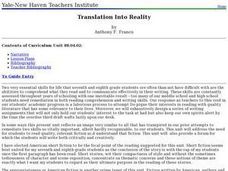Curated OER
Tension: Creative Writing
“Desire + Danger = Tension.” Thus begins a PowerPoint that details how to create tension and maintain the reader’s interest in a story. Although text-heavy, the color-coded slides model how the D + D = T formula functions and the...
Curated OER
Make Up Your Story
Putting together an interesting story can be hard, but this set of worksheets will guide your writers into the depths of their own creativity as they characterize both their main character and villain. Using humor to keep learners...
Curated OER
Creating Interesting Characters
What makes a story interesting? Complex characters! As part of a series of worksheets that prepares middle schoolers to write their own novel, the exercises included explain the role of the protagonist, the antagonist, and the supporting...
Curated OER
Antagonist
Young learners explore the antagonist. They retell Hansel and Gretel and identify the witch and the stepmother as antagonists. They then brainstorm common character traits of an antagonist, and then write a paragraph describing an...
Curated OER
Character in a Bag
Develop a mystery character using clues from a bag. This engaging activity will help learners understand character traits. They develop a list of the items from the bag, discuss and develop the character with a partner, and create a...
Curated OER
Dramatic Structure
As part of an lesson involving literature or writing, have your learners watch and discuss this presentation on plot development. In a series of slides, viewers engage in an activity to explore dramatic structure, including plot...
Scholastic
Writing a Myth
Use this writing prompt and brainstorming page to help your pupils prepare to write their own myths. Individuals must choose a natural event to explain, come up with a protagonist and an antagonist, determine a setting, and think of a...
Curated OER
Story Elements
Middle schoolers in particular will benefit from this simple presentation. Forty slides cover story elements like the protagonist, antagonist, and setting, and literary devices are also included. Some examples are given, but for the most...
Curated OER
Drama Terms Notes
Comedy, tragedy, act, scene, prop. do you want to review important drama terms? Actors record the term next to its definition on a worksheet that could be used individually or as a group activity. A link to a corresponding PowerPoint...
Curated OER
Academic Vocabulary
Arm your writers with an arsenal of literary terms. With definitions of everything from plot structure and figurative language to point-of-view and types of irony, learners will gain an understanding of elements in stories and be able to...
Curated OER
Comprehension-Characters/characterization
Fifth graders discuss characterization as well as to define antagonist and protagonist. For this language arts lesson, 5th graders write questions for an interview of a character in the book "The Three Little Pigs" and then answer them....
Curated OER
Fallen Angels
Students read the novel, Fallen Angels, and examine the theme of coming of age during the Vietnam War. They create timelines of the 1960s, highlighting important issues of the era. They write research papers focusing on one particular...
Curated OER
Evaluating a Book By Its Cover
Students practice using predictive strategies before reading a book. In this literacy activity, students identify the theme and characters of the novel based on the cover illustrations.
Read Works
Protagonist
Teach your class how to identify the protagonist in a story. The plan suggests starting with a protagonist from a tale you have previously read in class. Then, you can read a new story and work together to identify the protagonist,...
Curated OER
Translation Into Reality
Young scholars read a variety of short stories that focus on teenage protagonists. In groups, they answer comprehension questions and discuss the characters and setting for each story. Individually, they choose one writing assignment to...
Curated OER
Elements of Short Stories Vocabulary
In this literature instructional activity, students match the correct word from the first column to the best definition found in the second column. There are twenty words and definitions to match.
Curated OER
The Nature of the Antagonist
Students explain the differences between protagonists and antagonists and recognize the fundamental purpose of an antagonist or villain in storytelling. They also explain conflict as used in literature.


















